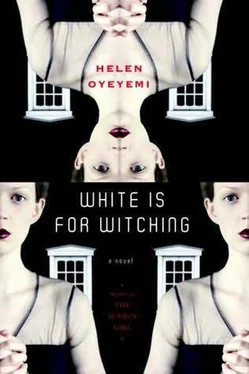The main picture was of a boy a little older than her. He was wearing a denim jacket that looked too snug across his shoulders. His eyes were nervous blurs. He was dead. His face was so smooth; he was old enough to shave but young enough to still be excited about shaving and thus meticulous.
She was not sure how to pronounce his name, not even in her head would the sound make any sense. She had to look away to stop herself from making up more stories about him. Also because from the page he said, Look away, look away from me, what can you do, nothing so don’t. The article commented on the silence of the local refugee community. No one was naming names, or even suggesting any.
Eliot told Miranda that it was a sign of the community closing to protect its own. “It’s refugees killing other refugees, man. I know you can’t believe it, I don’t want to believe it either, but, you know what… it’s far too simplistic to assume that just because they’re escaping similar troubles and are from the same geographic location, that it’s all love and harmony when they get over here. There are a bunch of differences between these people that precede their status in this country. Some of them really hate each other. I’ve seen kids openly spit at each other because of differences in language and what speaking a certain language means.”
Miranda slumped in her seat. What Eliot was saying made sense but it didn’t. There was an untruth to it that made her tired. “Like, some Armenians who speak only Armenian consider Armenians who speak Turkish to be Turks and synonymous with the very oppression that exiled them—”
Luc made a face.
“You sound like you’re quoting from some sort of textbook. Far too general. Besides, why would you suddenly recover a sense of solidarity and try to protect a killer when the police come around?”
“Because they’re even more hostile to the police than they are to each other? Because the truth is too good for the police? Because the police are a symbol of the country that’s fucking them over and assigning them marginal status?” Eliot suggested.
Luc shook his head. “One moment, Eliot. Put the sociological exercise aside. Since we’re talking about family here. Family. And say you knew who had hurt someone in your family and you also knew that the police have the power to stop and punish it. You really wouldn’t say anything?”
Miranda shook her head, then nodded, unsure which movement was appropriate. She handed the newspaper back to Eliot and went back to spinning combinations in her suitcase lock. Eliot and Luc continued to argue, Luc trying hard to sound amiable, Eliot trying hard to sound impassioned.
The car stopped at a traffic light, the last one before home. There were some girls sitting on the bicycle railings outside the corner shop, chewing gum, kicking out at each other, talking and squealing. Miranda couldn’t hear their hoop earrings jangling from where she was, but she felt the vibrations. These girls were Kosovan girls; when they weren’t together they were impassive, tough, their hair gelled into stiff fans with curls slicked down over their foreheads. You saw them in the supermarket holding doubled up carrier bags open, ready to fill with shopping, standing and gazing inscrutably into middle distance while their mothers fumbled through the folds of their big shawls, looking for food vouchers to pay with. One of these girls was in Miranda’s English literature class, and her voice, soft and uncertain, belied her eyes. As the car moved past, one of the girls in the group bounced her gaze off Miranda’s, then looked again, harder. She climbed down off the railings and strode over to the roadside with two other girls behind her. They were mouthing and pointing at her. Miranda didn’t know what to do, so she closed her eyes. Eliot was quiet and Luc whistled and tapped his fingers on the steering wheel. A jolt as the traffic light changed. She opened her eyes and saw the girls, a little behind, running. Luc said, “Are those girls running after us?”
Miranda couldn’t think what they wanted with her, those girls. She blurted, “Drive faster—”
Eliot laughed. “It’s alright,” he said. “They’ve given up.”
The girls had stopped and were a street behind, each of them bent over, holding their sides. The girl who had first noticed her was still looking, though. Miranda couldn’t see her expression.
She had thought that coming home would hurt, but actually she was fine. There were lights shining from the house windows that didn’t have their curtains drawn, harsh yellow scattered between the top and bottom floors, two on top and three on the bottom, like a smile.
Azwer, the gardener, and Ezma, the housekeeper, came to meet Miranda at the door; their foreheads were wrinkled and their eyes were watering with emotion. Ezma squeezed Miranda’s hands and Azwer said, “Good, it’s good.” What was good; the quality of the repair that had been done at the clinic?
Ezma turned her attention back to a woman who was writing a cheque against the telephone table. The woman’s hair was full of shiny star-shaped hair clips. She was an American. She bit on the end of her pen and said dreamily, “You should grow blueberries out in the back. I think blueberries bless a place, and are great in pie. If you crush oyster shells and spread them on the soil, it’ll make the earth much richer and better for growing things in.”
Ezma smiled at the woman. “We don’t serve oysters,” she said.
Miranda took her suitcase up in the lift, feeling like a guest. She missed being able to see to the bottom of the shaft, the mysterious dustiness of it. She went into her room and there was a stack of cards on her bed, cards filled with hugs and kisses from girls at school. She wondered what Eliot had told them, and whether it was worth returning to school with an assumed limp and only the vaguest explanation of her absence: something about having fallen out of one of the trees at the back and having broken her whole body, “You know… just everything .”
Miranda’s room smelt of musty petals, and she could hear Eliot avoiding her, helping Azwer to shovel snow outside. The dull click of spades on gravelled ice.
In a psychomantium glass topples darkness. Things appear as they really are, people appear as they really are. Visions are called from a point inside the mirror, from a point inside the mind.
Miranda looked in.
She looked with the most particular care and she saw Lily Silver standing there in her room, smiling sadly.
It took half a minute, too long a terror, to realise that she was only looking at herself. Wasn’t she? It was the haircut and the fact that she had grown thinner and her eyes had grown bigger in her head. She had been eating exactly what she liked, and she didn’t like the usual things.
Still, Lily seemed to gaze and gaze at her and say, Oh, Miri. You fell asleep. How could you?
Miranda turned away from the mirror. “I don’t like this blame culture,” she whispered. “I don’t like it at all.”
She checked Lily’s watch. It was midnight in Haiti. The ticking of the watch grew very loud; she wished it would not tick so loudly. She fumbled across the room to put on a CD, but she had taken it out and put it back in, pressed play three times before she realised there was nothing wrong with it, it played every time she pressed the button. There was Ella Fitzgerald, whispering a tisket a tasket . She gritted her teeth. She needed the sound of the watch stopped; she couldn’t hear the music for the sound of the watch. She knelt on the floor and slammed her wrist against it.
Tick, tick
(break it break it)
tick, tick
It was the pain that made her realise what she was doing. She undid the watch clasp, inspected it for damage, then put it on the table and rubbed her swollen wrist. Then she felt for her pills, cursing her hand for trembling so much. She put her steady hand over her trembling hand, to no effect. She lay down and didn’t want to shut her eyes. With the curtains drawn it could almost be night. But she heard someone talking to Luc downstairs, she heard the clatter of cutlery, she heard the whir of
Читать дальше












